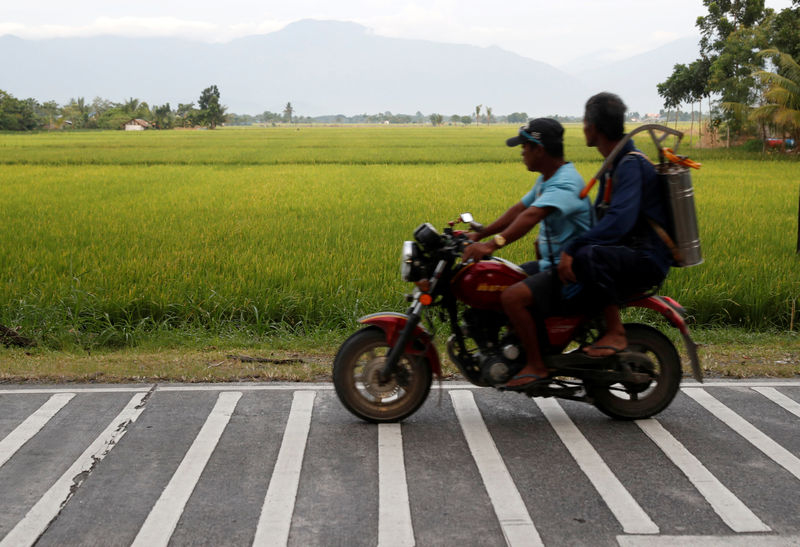By Enrico Dela Cruz
MANILA (Reuters) - The Philippines is gearing up to scrap more than two-decade-old caps on rice imports in the face of raging inflation and the possible threat of trade sanctions over the policy, a revamp that could bring relief to consumers but pain to farmers.
The move would also be a boon to the Philippines' main overseas suppliers of the grain, Vietnam and Thailand, with imports seen potentially doubling to 3 million tonnes a year, making the nation the world's No.2 buyer after China.
Rice prices in the Southeast Asian country's shops and markets climbed about 9 percent from January to July to an average 42 pesos (78 U.S. cents) per kilo amid limited supplies due to import delays.
That jump has hit consumers hard in a country where rice is at the heart of people's diets, and has helped keep inflation at its highest in over nine years.
"Pulling down rice prices is crucial to poverty reduction because this staple is a major driver of inflation," Gil Beltran, undersecretary in the department of finance, told Reuters.
President Rodrigo Duterte, whose government has been suffering signs of decline in opinion polls in the wake of the high inflation, has been pushing for Congress to give the go-ahead to replace the import limits with a system of tariffs.
The policy shift was approved by the lower house in early August, and head of the Senate food and agriculture committee Cynthia Villar said this week that the upper chamber would start deliberations on the issue "any day now".
Under the move, supply from Southeast Asia will be charged a 35 percent tariff and imports from elsewhere will face duty of up to 180 percent, with proceeds used to help farmers by financing projects to modernize the industry and boost its efficiency. Only about 1 percent of imports come from countries outside Southeast Asia.
Even with a 35 percent tariff, imported rice would cost around 30 pesos a kilo, over 10 pesos cheaper than current prices for local grain.
The government could raise up to 27 billion pesos annually, or about $500 million, from rice tariffs, according to finance department calculations.
But farmer groups said in a paper presented to lawmakers in July that the step would drive down prices for their produce, hurting their business and impacting local supply chains.
"The whole rice market chain will be affected as millers, traders, truckers and other service providers could be dislocated by the influx of massive volumes of rice imports that will displace local produce," they said.
Production costs are much lower in Vietnam and Thailand, which are blessed with wide plains irrigated by large river systems that allow them to churn out large rice surpluses.
"Once the market gates are fully opened and without any restrictions in place, no safety nets can protect the local rice industry from the influx of massive rice imports," said Antonio Flores, secretary general of farmer group Kilusang Magbubukid ng Pilipinas.
GRAPHIC: Philippine rice industry - https://tmsnrt.rs/2LAKqH5
SPECIAL TREATMENT
The Philippines was allowed to keep the cap when it joined the World Trade Organization and lifted non-tariff barriers on other agricultural products in 1995. It limits private sector imports to 805,200 tonnes a year.
That special treatment aimed at protecting local farmers was extended several times until 2017, but some WTO members bargained for non-rice trade concessions. Manila decided not to seek any further extension to avoid more trade-offs.
"We are technically in violation of the WTO agreement, which means they can impose sanctions on us anytime," said Roehlano Briones, a research fellow at policy think-tank Philippine Institute for Development Studies.
The price spikes have been much more pronounced in the country's southern provinces, where residents recently scrambled for limited supplies following a crackdown on rice smuggling that had remained unchecked for years.
The crisis in Zamboanga, Basilan, Sulu and Tawi-Tawi provinces, where residents formed long queues to buy limited emergency supplies, has prompted calls for the resignation of food security officials, including Agriculture Secretary Emmanuel Pinol.
Smugglers bring as much as 600,000 tonnes a year into the Philippines, based on unverified industry estimates.
Pinol said in a Facebook (NASDAQ:FB) post that while the import caps should be lifted, the country should be wary of becoming overly dependent on cargoes from abroad, especially as climate change and population growth could wreak havoc on international supply down the line.
"There will be a time in the near future when the demand for food from their own people would effectively prevent (producers) from exporting," Pinol warned.
"We would end up paying more ... or we would have the money, but there would be no rice available."
